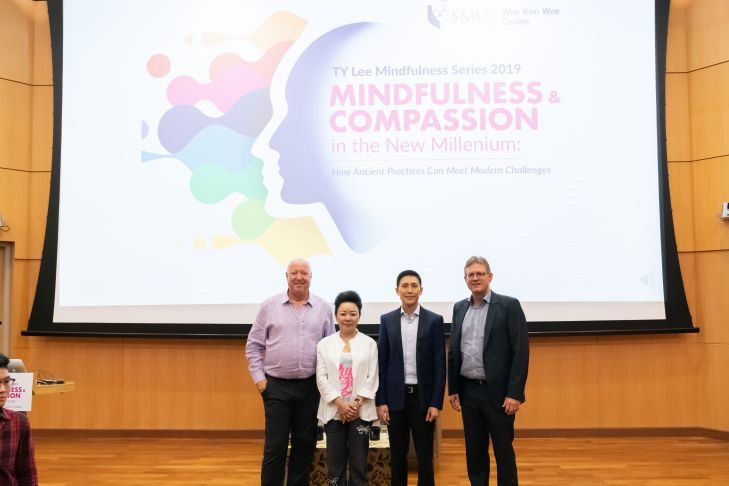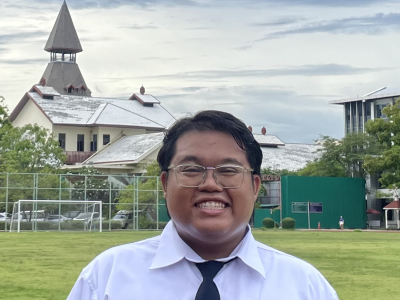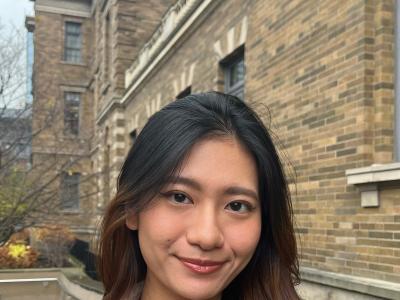
“The arc of mindfulness and compassion in modern society comprises awareness, acceptance and action. Mindfulness, is perhaps not just about accepting things, but about having the courage to change things,” said Dr Steven Hickman at the inaugural TY Lee Mindfulness Distinguished Lecture Series, held at the Singapore Management University (SMU) on 3 September 2019.
Addressing more than 280 students, staff, faculty and members of the community who had gathered that evening at SMU Ngee Ann Kongsi Auditorium, Dr Hickman started the lecture with a one-minute meditation practice. He was at SMU to speak on how meditation held relevance to our everyday modern life, in a lecture titled Mindfulness and Compassion in the New Millenium: How Ancient Practices Can Meet Modern Challenges.
Organised by SMU’s Wee Kim Wee Centre and the Office of Core Curriculum, the lecture was the first of a series, aimed at making meaningful impact by catalysing the exchange of ideas and perspectives on pertinent issues affecting the well-being of people, organisations and societies. SMU’s Core Curriculum, undergirded by the three pillars of Capabilities, Communities, and Civilisations, will be the first step toward the transformative education that each SMU undergraduate will experience, and will contribute toward the fulfilment of SMU’s Graduate Learning Outcomes.
In his welcome remarks, SMU Dean of Core Curriculum and Director of Wee Kim Wee Centre, Prof Elvin Lim, said, “The topic of mindfulness was curated in relation to SMU’s undergraduate academic offerings, specifically to the mandatory course under SMU’s Core Curriculum, titled Big Questions, and themed Happiness and Suffering. SMU’s Core Curriculum delivers a common intellectual experience for our students through three learning paths: Capabilities, Communities and Civilisations. Students are provided with the appropriate environment and opportunity to deepen their understanding and knowledge of the world, and to cultivate emotional intelligence and decision-making skills which are critical skills in the workplace.”
“In 2013, SMU introduced a Mindfulness Initiative with the aim of making positive impact on individuals, organisations and society by engaging in research, education and outreach on mindfulness,” added Prof Lim. “We welcome you to explore and benefit from the faculty research and programmes on secular mindfulness-based approaches to stress reduction, that are supported by this initiative.”

Dr Hickman, who is a licensed clinical psychologist and Founding Director of the UC San Diego Center for Mindfulness, observed that few developments in the field of human well-being have been more pervasive in society in the past few decades than the application of mindfulness to cope with human stress, pain, illness and suffering. The science behind this ancient practice is vast and growing, and the empirical support for the simple discipline of bringing attention to the present moment is remarkable.
More recently, society’s embrace of mindfulness has expanded to include not just the mind, but the heart as well. The basic human capacity for compassion, the inclination to be happy and free from suffering is intricately entwined with mindfulness as well as creating a powerful means of human healing and growth.
Dr Hickman then reviewed the modern history and accomplishments of mindfulness and compassion endeavours. Modern citizens of the world are facing unprecedented challenges in the new millennium, fueled by technology, dwindling resources, and socio-political turmoil. Increasing numbers of individuals in present times experience pervasive feelings of loneliness, isolation and alienation that contribute to harmful and destructive behaviours in many forms.

Drawing from his experiences as a certified teacher of the Mindfulness-Based Stress Reduction and Mindful Self-Compassion programmes, Dr Hickman shared how compassion could help us to cultivate our inner emotional strengths, comfort ourselves when we suffer, and to rediscover and align with our core values. He spoke about the personal practice of mindfulness, compassion and self-compassion as a possible means to finding our way, as citizens and as a society, to a fulfilling life of peace, ease and understanding, even amid huge challenges and worldwide problems.
“Don’t believe everything you think. Thoughts come about due to the neurons in the brain. Mindfulness helps us to accept the reality of pain, and therefore helps us to respond, rather than to just react,” said Dr Hickman. Highlighting a 3-step plan of awareness, acceptance and action to the practice of mindfulness and compassion, he suggested several ideas that the audience could easily and immediately apply. These included finding ways of doing less and becoming less “crazy busy” to make life more meaningful and purposeful.

In a lively Question and Answer session moderated by Jochen Reb, Associate Professor of Organisational Behaviour & Human Resources and Director, Mindfulness Initiatives, SMU, Dr Hickman fielded questions from the audience. Topics discussed included the inner critic, recognising loneliness in our hyper-connected modern lives, the compatibility of mindfulness with human progress and the top characteristics of a compassionate leader.

[Featured photo: (from left) Dr Hickman, Founding Director of the UC San Diego Center for Mindfulness; Mrs TY Lee; Prof Elvin Lim, SMU Dean of Core Curriculum and Director of Wee Kim Wee Centre; and Jochen Reb, Associate Professor of Organisational Behaviour & Human Resources and Director, Mindfulness Initiatives, SMU, at the inaugural TY Lee Mindfulness Distinguished Lecture Series held at SMU.]


